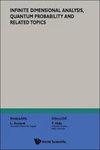具有独立增量的非交换随机过程
IF 0.8
4区 数学
Q4 MATHEMATICS, APPLIED
Infinite Dimensional Analysis Quantum Probability and Related Topics
Pub Date : 2022-07-12
DOI:10.1142/s0219025722400094
引用次数: 0
摘要
本文是关于威廉·冯·瓦尔登费尔斯在量子(或非交换)概率论数学领域的研究。威廉·冯·瓦尔登费尔斯无疑是这一领域的先驱之一。他的想法是研究矩并用自由代数代替可交换变量中的多项式,这些代数在非可交换量中扮演多项式代数的角色。在他对量子概率做出贡献之前,他已经研究过自由代数和自由李代数。可以想象,这有助于他创造出自己独特的代数方法,这种方法被证明是非常富有成效的。他是物理学出身。他的博士论文由海因茨·康尼格指导,是关于概率论的,是关于群的概率论中更现代、更代数化的分支。也许物理学、抽象代数和概率论这三者是成为量子概率论的先驱,甚至是创始人之一的最好的先决条件。我们集中在威廉冯瓦尔登费尔斯的科学工作的一小部分。物理学的各个方面实际上根本没有被提及。他在群(瓦尔登费尔算子)上的经典概率结果中没有任何内容。这是一个试图展示非交换的概念,独立性的概念和结构上的L ' evy过程,如Hopf代数,是如何从威廉·冯·瓦尔登费尔斯的思想发展而来的。本文章由计算机程序翻译,如有差异,请以英文原文为准。
Non-commutative stochastic processes with independent increments
This article is on the research of Wilhelm von Waldenfels in the mathematical field of quantum (or non-commutative) probability theory. Wilhelm von Waldenfels cer-tainly was one of the pioneers of this field. His idea was to work with moments and to replace polynomials in commuting variables by free algebras which play the role of algebras of polynomials in non-commuting quantities. Before he contributed to quantum probability he already worked with free algebras and free Lie algebras. One can imagine that this helped to create his own special algebraic method which proved to be so very fruitful. He came from physics. His PhD thesis, supervised by Heinz K¨onig, was in probability theory, in the more modern and more algebraic branch of probability theory on groups. Maybe the three, physics, abstract algebra and probability, must have been the best prerequisites to become a pioneer, even one of the founders, of quantum probability. We concentrate on a small part of the scientific work of Wilhelm von Waldenfels. The aspects of physics are practically not mentioned at all. There is nothing on his results in classical probability on groups (Waldenfels operators). This is an attempt to show how the concepts of non-commutative notions of independence and of L´evy processes on structures like Hopf algebras developed from the ideas of Wilhelm von Waldenfels.
求助全文
通过发布文献求助,成功后即可免费获取论文全文。
去求助
来源期刊
CiteScore
1.50
自引率
11.10%
发文量
34
审稿时长
>12 weeks
期刊介绍:
In the past few years the fields of infinite dimensional analysis and quantum probability have undergone increasingly significant developments and have found many new applications, in particular, to classical probability and to different branches of physics. The number of first-class papers in these fields has grown at the same rate. This is currently the only journal which is devoted to these fields.
It constitutes an essential and central point of reference for the large number of mathematicians, mathematical physicists and other scientists who have been drawn into these areas. Both fields have strong interdisciplinary nature, with deep connection to, for example, classical probability, stochastic analysis, mathematical physics, operator algebras, irreversibility, ergodic theory and dynamical systems, quantum groups, classical and quantum stochastic geometry, quantum chaos, Dirichlet forms, harmonic analysis, quantum measurement, quantum computer, etc. The journal reflects this interdisciplinarity and welcomes high quality papers in all such related fields, particularly those which reveal connections with the main fields of this journal.

 求助内容:
求助内容: 应助结果提醒方式:
应助结果提醒方式:


